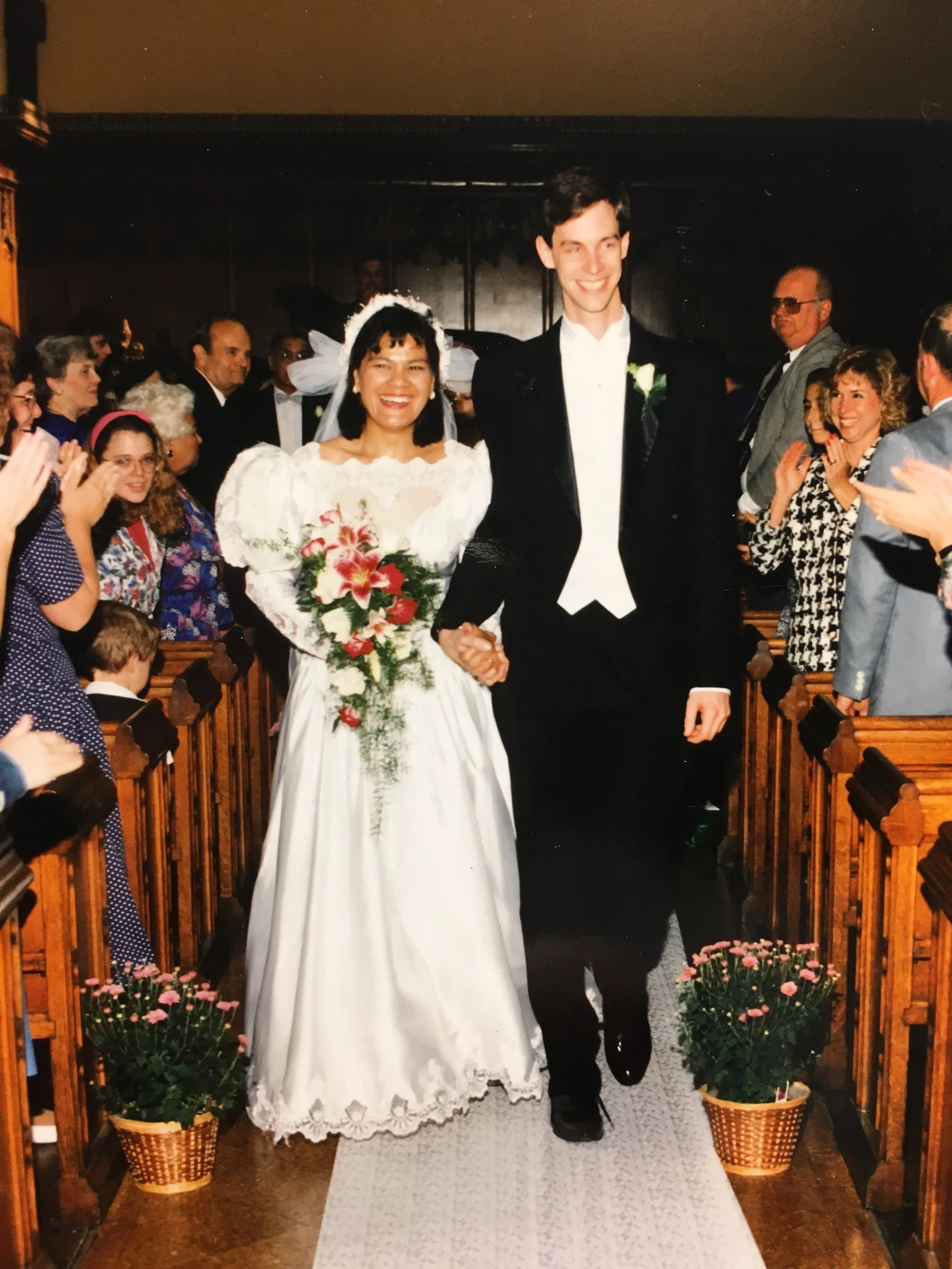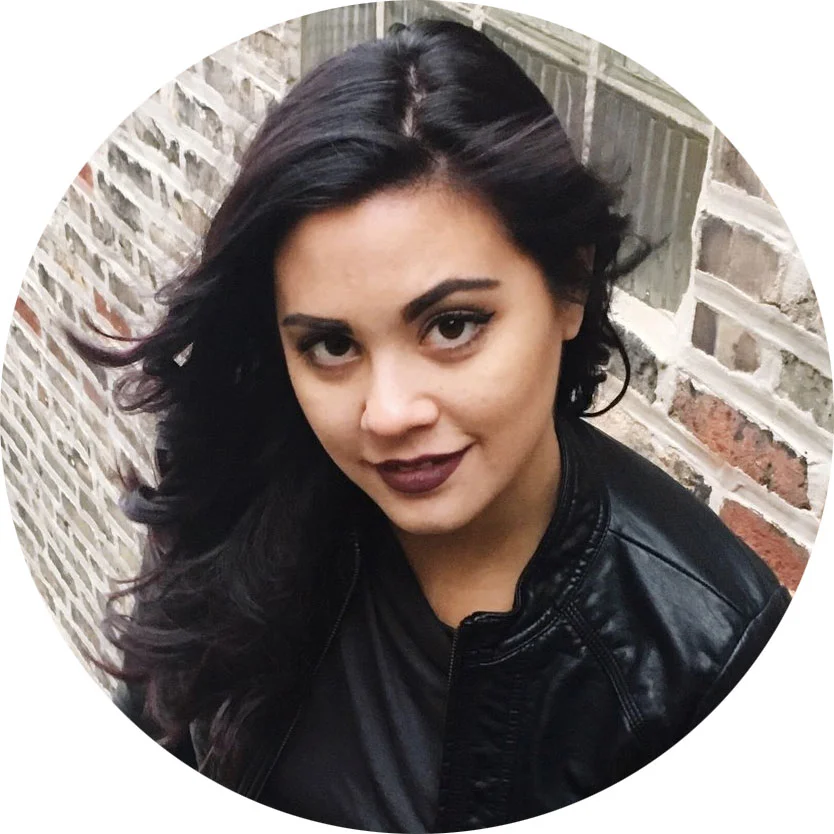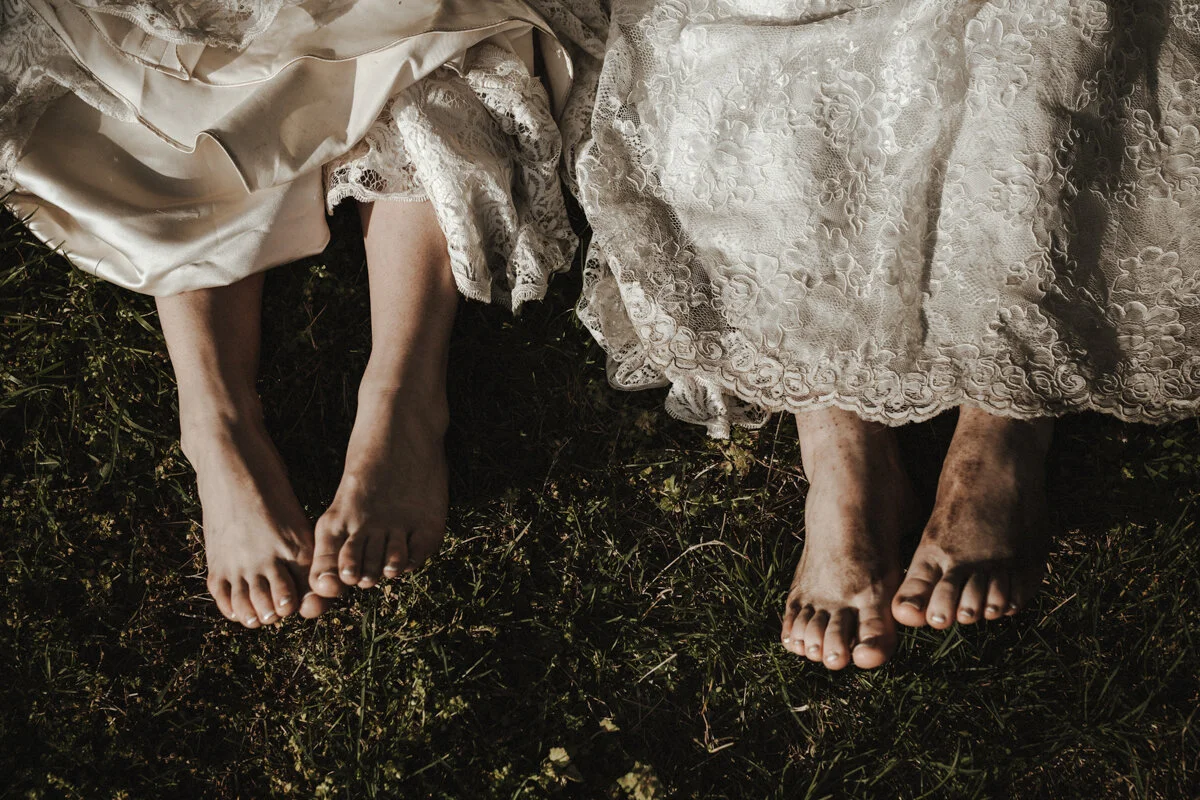My Feminist Wedding // Digging into Family History of Cultural Oppression
/When Deborah Foell's mother tentatively asks permission to wear a Kebaya to her wedding, she steps away from the chaos and checlists to explore how the process of planning her own wedding reveals decades of familial oppression.
Deborah's grandparents, 1953
Like any bride-to-be, I fear the onset of Bridezilla. No one wants to be the demanding, panicking, stressed-out bride, but despite my fear, I still understand that at some point, I will probably fall victim to at least some of the symptoms. I have my daily food journal, my weekly meal and exercise plan, and my monthly calendar all within a few feet of each other. My clothes are sorted by color, and I wear heels more often than not, whether at work or in daily activities. To put it simply: I like things a certain way, and the details of my upcoming wedding are no exception.
I suppose with this mindset, it’s easy to understand why my mother came to me and asked, almost with trepidation, if I would allow her to wear a Kebaya to my wedding.
My mother emigrated from the Netherlands when she was three years old in 1960, along with her Indonesian-born parents, two older sisters and brother, to Boston, Massachusetts. A few years later, the youngest sibling was born.
My grandparents were part of the buffer class unintentionally established by the Dutch over their three hundred and fifty years of colonialism in Indonesia. My very Asian-looking grandmother has the beautiful European name of Gladys, and her dark husband is named Renee. Throughout the years, a few stories and asides have been mentioned in passing by both of my grandparents, and a documentation of their experiences as teenagers in Indonesia was in process. Piecing together these stories results in a remarkable history of my family and culture.
Every day, the neighbors would back out of their shared driveway, and my mom and her sister would energetically wave at their new neighbors. When my grandparents returned, they were told “what nice and friendly help you have! They always waved to us whenever we saw them!”
Growing up, my grandparents were part of the middle class called “Indos,” a product of the Dutch encouraging their soldiers to marry Indonesian women and create a three-tiered class system. My grandparents grew up speaking Dutch and were educated in Dutch until World War II broke out when they were children; my grandmother was eight, and my grandfather was 12. Put in concentration camps by the Japanese during the war with other Indos and native Indonesians, they continued to be victimized by Indonesian freedom fighters following the war's end.
In 1953, they left for the Netherlands, where once again they couldn’t find their home and were ostracized by the blonde, pale, blue-eyed Dutch. The physical and cultural differences between my family and those of their new home led to the decision to, once again, immigrate. This time, they left for the United States, but unfortunately, they didn’t find their home in America right away either. Stories abound about the ways the predominately white population around them used racial slurs and other ways of emphasizing their differences. After being told by the bank he worked for that despite his hard work and talent, an “Oriental” would never be manager, they left Boston in 1970 for Shaker Heights, a suburb of Cleveland, Ohio.
Deborah's grandparents, 1960
For my grandmother, an avid gardener, inclusion in the local gardening club and historical society was a goal to be achieved. When she finally was allowed to join, and eventually rose through the ranks to become the president, she was jilted at an award ceremony when the trophy was handed to her Caucasian vice president beside her.
My mother laughingly reminisces that when she and her sisters would ride their bikes to the country club where they worked, they were identified as the “Asian girls”, and more than one patron was surprised when they found out the girls’ parents could afford the hefty property taxes to live in the community and that they weren’t commuting from a poor neighborhood to work.
I think the memory that resurfaces the most often is a time when, shortly after my grandparents moved into their new house in Gates Mills, they left for a vacation. My mother and her sister decided to help tend to the garden while they were away. Every day, the neighbors would back out of their shared driveway, and my mom and her sister would energetically wave at their new neighbors. When my grandparents returned, they were told “what nice and friendly help you have! They always waved to us whenever we saw them!”
When my mother was engaged, her mother was adamant that the reception be held at the neighboring Hunt Club. To this day, members have to be invited, and weddings can only be held there with sponsorship by a member. For my grandmother, having the connections to gain entrance to the elite fixture in their neighborhood was a point of pride. Since my parents were paying for most of the wedding themselves, they wanted a venue with more economical options. Outraged and personally affronted, my grandmother withdrew her support and—even though tasked only with bringing the flowers—refused to confirm they were attending.
Deborah's parents, 1992
A few weeks after my own engagement, my mother sent me a video of five-foot-tall (on a good day) Gladys giving me wedding advice. Her adamant instruction to “not let anyone bamboozle you” and to remember that “it’s your day; no one can tell you what to do,” was especially amusing, given that only 25 years prior she was making as many decisions for my parents as she could.
The history of my family is a heartbreaking, but inspiring, journey of trying so hard to find their place in America and live their “American Dream.” In many ways, my grandparents stifled their heritage and made sure my mother and her siblings did the same. While holiday family occasions are filled with the older group speaking more Dutch than English, during their childhood they were not allowed to speak anything but English. For many years, my grandparents refused to talk about their experiences prior to moving to America, especially anything regarding the war.
When I asked my mom why it was so meaningful to her that I immediately answered “yes” to her request of wearing a Kebaya on my wedding day, she simply said that she wanted people to see her color and her culture, and this was one of the few ways she had the opportunity to “strut her culture."
For my mother and her siblings, they identify more as Indonesian than they do Dutch and are proud of the few facts they know of their heritage. Nevertheless, any family event is the conglomeration of everything Dutch, Indonesian, and American. We use Dutch words to address our grandparents: Opa and Oma; my aunts are called “Tante,” and my uncle is called “Oom.” A day spent together can start with poffertjes (silver dollar-sized Dutch pancakes cooked in a special cast iron pan) at breakfast, hagelslag (Dutch sprinkles) on white bread with butter for lunch, and bami or nasi goreng (fried rice or noodles), babi kecap (pork with sweet soy sauce) for dinner, and followed by a dessert of oliebollen (Dutch donuts), with of course, an occasional offering of cheesy potatoes and store-bought bread.
When I asked my mom why it was so meaningful to her that I immediately answered “yes” to her request of wearing a Kebaya on my wedding day, she simply said that she wanted people to see her color and her culture, and this was one of the few ways she had the opportunity to “strut her culture."
When I think about my wedding, of course the decorations, centerpieces, thoughtful invitations, and my color scheme come to mind. But what I think might keep me from fully morphing into a Bridezilla is what truly brings me the most joy out of all of the little details: the people who will be there to support me as I marry the love of my life. My Kebaya-wearing, beautiful immigrant mother; my American-as-you-can-get, ancestors-founded-one-of-the-thirteen-colonies father; my biracial, black, white, Asian, and redheaded bridesmaids; and of course, my wonderful Air Force veteran fiancé. My culture is a huge part of who I am, and I am thankful that I have classmates, friends, and family who reflect some of the beautiful diversity seen in America today and that I’ll get to see and live that diversity first hand on my wedding day.
Meet Deborah Foell: A proud graduate of the George Washington University, Deborah has worked in the field of undergraduate admissions since completing her bachelors in International Affairs in 2014. She and her black rescue cat, Drolletje (Dutch word meaning little turd, Drolle for short), live in Pittsburgh, Pennsylvania. In her spare time, Deborah avoids training for her upcoming 10K by focusing instead on planning for her marriage to (long-standing crush and fiancé) Tyler, as well as the brunch reception to follow (mostly by perfecting champagne to orange juice ratios for mimosas), and applying to grad school (not at the same time). For questions, comments, concerns, or funny (related) stories, please email dejafoell@gmail.com, or follow her adventures with Drolle and Tyler on Instagram @dejafoe.
























